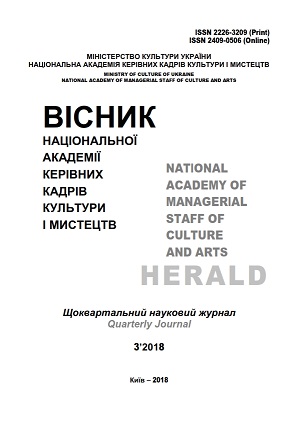«Тангейзер» Р. Вагнера у річищі еволюційних шляхів німецького музичного театру: міфопоетичні та жанрово-стильові аспекти
«Tannhauser» R. Wagner in the Mainstream of the Evolutionary Ways of the German Musical Theater: Mythopoetic and Genre-Style Aspects
Author(s): Anzhelika Anatoliyivna TatarnikovaSubject(s): Theatre, Dance, Performing Arts, Cultural history, Music, 19th Century, History of Art
Published by: Національна академія керівних кадрів культури і мистецтв
Keywords: German musical theater; musical theater of R. Wagner; «Tannhauser» R. Wagner; romanticism; Biedermeier;
Summary/Abstract: Purpose of the article is to reveal the poetic-intonational uniqueness of R. Wagner's opera «Tannhаuser» in the mainstream of the evolutionary, mythopoetic and genre-style specificity of the German musical theater of the 19th century. The methodology of the work is based on the intonational concept of music in the perspective of intonationalstylistic, etymological analysis, succession from B. Asafiev and his followers, and also on interdisciplinary and historicalculturological approaches. The latter allow us to identify the spiritual and semantic and style peculiarities of the musical theater of R. Wagner and distinguish it from the pan-European cultural area of the mid-19th century. The scientific novelty of the work is to broaden the understanding of the poetics of the musical theater of R. Wagner, in particular, the opera «Tannhаuser», which serves as one of the exemplary samples of the German opera of the period, and at the same time demonstrates a deep connection with the genre-style and mythological poetry of the culture of «the great German century» (Hugo von Hofmannsthal). Conclusions. The intonational-dramatic, spiritual and semantic characteristics of Wagner's «Tannhаuser» demonstrate the stylistic duality that is indicative of the German musical theater of the mid-19th century, based on the intersection of the romantic and Biedermeier traditions. The romantic quality of the «Tannhаuser» is also evident in the obvious parallels between the image of the protagonist (Minnesinger) and the contemporary (for the era of R. Wagner) artist, concerned with the search for the ideal; and in the accentuation of the idea of duality, revealed at the level of opposition between the real and the surreal. With the musical characteristic of the latter (the grotto of Venus), an innovative musical language is associated, based on a wide range of musical expressive means (chromatic, tonal instability, timbre richness, etc.). At the same time, the poetics of Wagner's «Tannhаuser» demonstrate the connection with the spiritual-style qualities of the German Biedermeier, revealed in the associations of the plot of the opera with the parable of the «prodigal son»; in a certain idealization of the characteristics of the real world, based on the typology of pastoral and traditions of church singing; in the spiritual concept of the image of Elizabeth, ascending to the sacred-mystery sources and their genre-typological characteristics.
Journal: Вісник Національної академії керівних кадрів культури і мистецтв
- Issue Year: 2018
- Issue No: 3
- Page Range: 353-358
- Page Count: 6
- Language: Ukrainian

